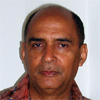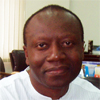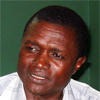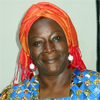West African Visions
|
Section 3.1 - 2007-2008 West Africa Report Towards Harmonious Use of Resources This third part of the Report addresses strategic questions from a global perspective related to the region's future and policy coherence. The Report gives the floor to six West African personalities: > Mr. José BRITO | > Ms. Ayoko MENSAH | > Mr. Ken Ofori ATTA | > Mr. Doumbo OGOBARA | > Ms. Aminata Dramen TRAORÉ | > Mr. Lionel ZINSOU |
 |
Minister of Foreign Affaires (Cape Verde) "Cape Verde just signed a special partnership agreement with the European Union. It is the first country in the sub-region to do this. While nobody believed we could do it, we asked Europe to finance our upgrade. Look what Spain and Portugal did before entering the European Union: they negotiated a transition period in which Europe invested so that they could catch up with the powerhouse. Thus we negotiated with the European Commission. We asked that Cape Verde be upgraded. We argued that we also border Europe and we could contribute to its security. It is tit for tat. When Europe argues with Africa usually it concerns money. But how does that help our countries change?" > read the interview (French) |
 |
Editor in chief of the magazine « Afriscope » (France-Togo) "Since the 1990s, the private press, whether it be written press or radio, greatly developed in West Africa. Thus there is a variety of media although the situation differs significantly according to country. There is some dynamism and much precariousness at the same time. There is a great amount of capabilities in the sub-region today. The problem is that journalists are in a precarious situation when they can popularize and pass on information. They also can be influenced by political and/or financial power. Training is a major issue: as it is in the cultural domain, many professionals learn the job but lack the skills. New technologies are an opportunity to form networks and exchange information. > read the interview (French) |
 |
Co-founder & Executive Chairman of Databank Financial Services (Ghana) "I think ultimately we all sort of dream about the United States of Africa so that’s there. Our first leader (Dr. Kwame Nkrumah) propounded that and I think it is something to aspire to. So I am not fundamentally against that kind of political infrastructure. Now you come to the reality of our economic landscape. You know, the difficulty of moving economies that are not modern is quite overwhelming. I suspect it will be difficult. Now whether we can have sort of financial policy, which therefore says we, as a region, are subsiding agriculture by X, Y, Z, I think those can be contemplated. Clearly, things like airlines can be regional, the power pool can occur, bus systems that are running across the region and highways that do that can be regional. So there is enough of a blend that could occur, without legislating areas that people should participate in." |
 |
Director of the Paludism Research & Training Laboratory (Mali) "You know, I am convinced – coming from a tiny village where, before my generation, no one knew how to read or write – that development depends on science and technology. As a child, it took me one week to go from my village to Bamako. Today, the trip takes 7 hours. Thus the development of Africa is possible. Even better, I would say that we don’t have a choice. We are going to skip stages, we have the tools to do so. Today, there are cell phones in our villages. We can call our parents anywhere in the world. It is a question of perception. To think that development is gold, oil or cotton is 19th century thinking. We are in the 21st century. It is creativity, technology, it is well-educated youth who are our assets." |
|
|
Altermondialist Militant (Mali) Africa is ridiculed giving it the impression, as well as the entire world, that democratic transition, like economic reforms, although the instructions are good, the States are mediocre or inefficient in implementing them. Occasionally, international financing institutions recognise their errors. […] The first problem with development aid, which has never gone above .07% of rich countries' GDP, is that it has too much influence over society’s projects. That’s how the countries where the leaders who are not respecting their choice and their intervention plan are punished. In other words, development aid serves the interest of the donor countries more than correcting the evermore glaring imbalances and injustices. It is also a means for corruption. > read the interview (French) |
 |
Member of the PAI Partners Executive Committee (Benin-France) "Peace is not a given for the future. It is a struggle and integration is a factor in economic development. It is all linked. For example, the treaty on the harmonisation of business law (OHADA) leads to the stabilisation of the region and thus to peace. As an illustration, theoretically there is no tariff barrier when 50% of the value added is attained within one ECOWAS country. But it is actually more complicated because to cover the 400 kilometres separating Lagos and Accra, three borders and more than fifty police roadblocks have to be crossed which are as much non-tariff barriers over a distance that can be travelled in 25 minutes by plane." > read the interview (French) |
Related Documents


